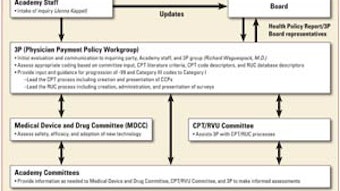ICD-10 HIPAA and the HIPAA Version 5010 Transitions
While the Health Insurance Portability and Accountability Act (HIPAA) Version 5010 and D.0 electronic transaction standards and ICD-10 code transition continues to pose a significant financial burden for providers, the Department of Health and Human Services (HHS) has been responsive to providers’ preparation needs and continues to delay deadlines to give providers, Medicare Administrative Contractors (MACs), and private payers more time to appropriately prepare. Despite this, providers should move toward full compliance as soon as possible to experience an optimum return on investing in the transition. The Office of E-Health Standards and Services (OESS) announced on March 15 that the enforcement deadline for compliance with HIPAA Version 5010 and D.0 standards will be delayed until June 30 of this year. As the delayed enforcement deadline for the transition approaches, several providers continue to experience delayed payments from MACs. Both MACs and providers alike have experienced problems with the transition, resulting in delayed payments and miscommunications between providers and MACs. Further, several providers have reported to the AAO-HNS Health Policy staff that some MACs have been unresponsive due to understaffed call centers. Moving forward, it will be important for providers, private payers, and MACs to fix any further clerical issues quickly in order to minimize financial difficulties. Providers must understand that, as of right now, the office responsible for enforcing compliance—the Office of E-Health Services and Standards (OESS)—has not established specific penalties for non-compliance with version 5010 standards. As a result, providers who are non-compliant may be exposed to HIPAA tiered penalties that may result in up to $1.5 million for repeated willful non-compliance. While it is highly unlikely that the OESS will pursue such penalties, non-compliant providers will not be paid by Medicare and/or several private payers, resulting in significant financial hardship. Although Version 5010 supports both the ICD-9 and the ICD-10 code set structures, it is not possible to create or transmit electronic claims using ICD-10 codes without transitioning to Version 5010 HIPAA transaction standards. Version 4010/4010A1 does not support ICD-10 codes. The ICD-10 transition will expand the current ICD-9 codes from roughly 17,000 codes under ICD-9 to roughly 140,000 total codes for ICD-10 (70,000 ICD-10-CM and 70,000 ICD-10-PCS). Notably, the expansion is expected to increase practice expenses dramatically for physicians making the transition. HHS shares the sentiment that implementation of ICD-10 code sets may cause serious cash flow problems for providers, but argues that these could be addressed through mechanisms, such as periodic interim payments. Given its recent announcement of its “intent” to delay ICD-10 implementation, HHS has begun to listen carefully to the physicians, vendors, and payers who will be affected by changes in the code set standards. In addition, the fact that the OESS has delayed the enforcement date for compliance with 5010 standards further demonstrates that HHS understands the hardship many providers face with the transition. Despite the anticipated delay in the deadline for full compliance with ICD-10, HHS advocates that ICD-10, in the long run, is anticipated to support operational and strategic planning, and improve clinical, financial, and administrative performance. As such, it lies in providers’ best interests to gravitate toward ICD-10 and Version 5010 compliance as soon as possible. Becoming familiar with the new code sets, providing training to preview the structure and conventions of ICD-10, educating staff regarding the difficulties of translating clinical documentation into appropriate codes, and utilizing innovative technology as mapping tools are just a few of many strategies providers should take to realize the benefits of ICD-10 sooner. For Academy Resources on the ICD-9 to ICD-10 transition, visit http://www.entnet.org/Practice/International-Classification-of-Diseases-ICD.cfm. If you or your staff are interested in additional educational materials on ICD-10, email the Academy’s Health Policy team at healthpolicy@entnet.org.
While the Health Insurance Portability and Accountability Act (HIPAA) Version 5010 and D.0 electronic transaction standards and ICD-10 code transition continues to pose a significant financial burden for providers, the Department of Health and Human Services (HHS) has been responsive to providers’ preparation needs and continues to delay deadlines to give providers, Medicare Administrative Contractors (MACs), and private payers more time to appropriately prepare. Despite this, providers should move toward full compliance as soon as possible to experience an optimum return on investing in the transition.
The Office of E-Health Standards and Services (OESS) announced on March 15 that the enforcement deadline for compliance with HIPAA Version 5010 and D.0 standards will be delayed until June 30 of this year. As the delayed enforcement deadline for the transition approaches, several providers continue to experience delayed payments from MACs. Both MACs and providers alike have experienced problems with the transition, resulting in delayed payments and miscommunications between providers and MACs. Further, several providers have reported to the AAO-HNS Health Policy staff that some MACs have been unresponsive due to understaffed call centers. Moving forward, it will be important for providers, private payers, and MACs to fix any further clerical issues quickly in order to minimize financial difficulties.
Providers must understand that, as of right now, the office responsible for enforcing compliance—the Office of E-Health Services and Standards (OESS)—has not established specific penalties for non-compliance with version 5010 standards. As a result, providers who are non-compliant may be exposed to HIPAA tiered penalties that may result in up to $1.5 million for repeated willful non-compliance. While it is highly unlikely that the OESS will pursue such penalties, non-compliant providers will not be paid by Medicare and/or several private payers, resulting in significant financial hardship. Although Version 5010 supports both the ICD-9 and the ICD-10 code set structures, it is not possible to create or transmit electronic claims using ICD-10 codes without transitioning to Version 5010 HIPAA transaction standards. Version 4010/4010A1 does not support ICD-10 codes.
The ICD-10 transition will expand the current ICD-9 codes from roughly 17,000 codes under ICD-9 to roughly 140,000 total codes for ICD-10 (70,000 ICD-10-CM and 70,000 ICD-10-PCS). Notably, the expansion is expected to increase practice expenses dramatically for physicians making the transition. HHS shares the sentiment that implementation of ICD-10 code sets may cause serious cash flow problems for providers, but argues that these could be addressed through mechanisms, such as periodic interim payments. Given its recent announcement of its “intent” to delay ICD-10 implementation, HHS has begun to listen carefully to the physicians, vendors, and payers who will be affected by changes in the code set standards. In addition, the fact that the OESS has delayed the enforcement date for compliance with 5010 standards further demonstrates that HHS understands the hardship many providers face with the transition. Despite the anticipated delay in the deadline for full compliance with ICD-10, HHS advocates that ICD-10, in the long run, is anticipated to support operational and strategic planning, and improve clinical, financial, and administrative performance. As such, it lies in providers’ best interests to gravitate toward ICD-10 and Version 5010 compliance as soon as possible.
Becoming familiar with the new code sets, providing training to preview the structure and conventions of ICD-10, educating staff regarding the difficulties of translating clinical documentation into appropriate codes, and utilizing innovative technology as mapping tools are just a few of many strategies providers should take to realize the benefits of ICD-10 sooner.
For Academy Resources on the ICD-9 to ICD-10 transition, visit http://www.entnet.org/Practice/International-Classification-of-Diseases-ICD.cfm. If you or your staff are interested in additional educational materials on ICD-10, email the Academy’s Health Policy team at healthpolicy@entnet.org.







